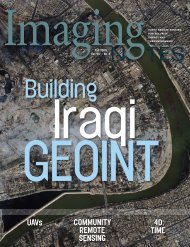download PDF - Imaging Notes
download PDF - Imaging Notes
download PDF - Imaging Notes
Create successful ePaper yourself
Turn your PDF publications into a flip-book with our unique Google optimized e-Paper software.
“If there is one thing the<br />
Obama Administration<br />
could do over the next<br />
four years to really make<br />
a difference, it would be<br />
to make environmental<br />
information a priority.”<br />
WE NEED TO<br />
FIND A BETTER<br />
WAY TO TIE THIS<br />
INFORMATION<br />
TO ECONOMIC<br />
SECURITY.<br />
availability How will we ever move<br />
towards integrated information that<br />
produces environmental intelligence<br />
S&S Is there a lack of leadership or is<br />
the science community just not being<br />
paid attention to<br />
COLLETON I do believe there is a lack<br />
of leadership. You have these capabilities<br />
spread through a number of<br />
federal agencies. The U.S. Geological<br />
Survey is responsible for the Landsat<br />
program; NASA is doing research<br />
satellites; NOAA is responsible for<br />
the operational weather satellites;<br />
the National Science Foundation<br />
is funding research, and then you<br />
have cubesats, uavs, aircraft, ocean<br />
buoys, balloons, stream gauges, and<br />
on and on… When you consider our<br />
Earth observation capabilities and the<br />
number of agencies involved, there’s<br />
really no one responsible at a high level<br />
to look at all these capabilities and to<br />
make sure that the United States has<br />
a vision and a road map for achieving<br />
it. What is different is that we need to<br />
find a better way to tie this information<br />
to economic security.<br />
If there is one thing the Obama<br />
Administration could do over the next<br />
four years to really make a difference,<br />
it would be to make environmental<br />
information a priority – find ways to<br />
infuse greater innovation and efficiency,<br />
to engage the private sector both as<br />
users and providers of information, and<br />
to establish a long-term plan.<br />
I think we desperately need to focus<br />
on taking that government investment<br />
and leveraging it to grow the U.S.<br />
economy. That happens two ways:<br />
first, all this environmental intelligence<br />
that is produced helps us to better<br />
manage risk. The second way is in<br />
building up the capacity and private<br />
enterprise around the government<br />
investment. You see that with weather.<br />
At The Weather Channel, for example,<br />
they don’t have their own satellite; they<br />
use satellite data from NOAA.<br />
S&S What are some of the strong<br />
economic impacts<br />
COLLETON If you just look at it from<br />
a natural disaster standpoint the<br />
numbers are staggering. Equicat<br />
estimates that Hurricane Sandy is<br />
resulting in $20 billion in insured<br />
losses, and $50 billion in economic<br />
losses. Those numbers are likely to rise<br />
though, because the power is not back<br />
on, some stores are still not open, and<br />
there are still transportation issues and<br />
structural issues around New York.<br />
Crop losses from the drought are<br />
estimated at $25 billion. The drought<br />
also has caused low water levels on<br />
the Mississippi, which have led to<br />
commerce and transportation impacts.<br />
The New York Times recently reported<br />
that $7 billion in products could be<br />
stalled in the December-January timeframe<br />
if water levels don’t increase.<br />
S&S It’s something that was forecast,<br />
in terms of long-term warnings, that<br />
this level of damage might be possible<br />
with a major storm, just like Hurricane<br />
Katrina was one of the top ten possible<br />
disasters and then it occurred. When is<br />
there some liability for not reacting to<br />
these long-term forecasts and building<br />
in some resilience and adaptability<br />
COLLETON I think that’s a really important<br />
question. A couple of weeks ago I<br />
was invited to speak on a satellite colloquium<br />
at a law firm. They were asking<br />
about some of the legal and regulatory<br />
issues coming up. The complexion of<br />
our forecasting sources is changing,<br />
and with climate change becoming ever<br />
more present, there are people who may<br />
ask, “why didn’t we better prepare”<br />
At some point I think there is going to<br />
be some liability somewhere. I’m not<br />
sure it will happen any time soon, but I<br />
suspect it will happen.<br />
Already there have been shareholders<br />
of companies that have been<br />
wondering, if the company is damaging<br />
the environment (specifically thinking<br />
about climate), what’s their liability<br />
as board members and shareholders<br />
Turning it around, if you have more<br />
companies in the weather enterprise<br />
IMAGING NOTES // WINTER 2013 // WWW.IMAGINGNOTES.COM<br />
21











